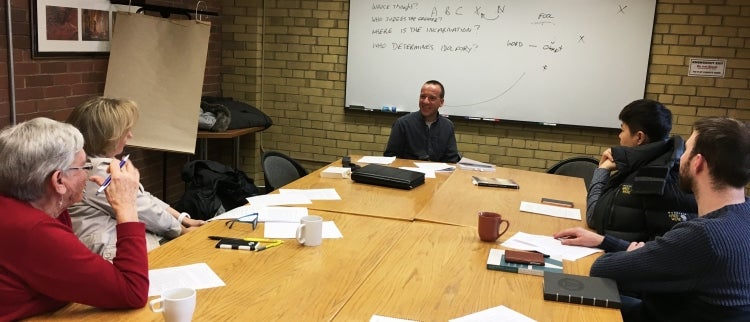 Toronto Mennonite Theological Centre (TMTC) tries to create an intellectual and spiritual community among Mennonites and others who are studying at the Toronto School of Theology (TST) in fields such as theology, ethics, Old Testament, New Testament, church history, pastoral studies, and in some related fields at the University of Toronto (U of T), such as religious studies, history, philosophy. TMTC has a Mennonite identity but is open to any students who wish to associate with such a group.
Toronto Mennonite Theological Centre (TMTC) tries to create an intellectual and spiritual community among Mennonites and others who are studying at the Toronto School of Theology (TST) in fields such as theology, ethics, Old Testament, New Testament, church history, pastoral studies, and in some related fields at the University of Toronto (U of T), such as religious studies, history, philosophy. TMTC has a Mennonite identity but is open to any students who wish to associate with such a group.
TMTC does not admit students or grant degrees. Rather, students register at a college of the TST, or at a department of the School of Graduate Studies, University of Toronto, and then choose to affiliate with TMTC. The level of commitment and involvement in TMTC is up to each student.
The list that follows gives a sampling of what TMTC has done in the past. The program continues to evolve with the needs and interests of students who associate with it. Thus, students who wish to affiliate with TMTC ought to consider not only how they may want to participate in existing programs, but which new initiatives might enhance their education and contribute to a community of learning.
How does TMTC contribute to the student experience?
-
TMTC offers graduate courses (MA or PhD level) in Toronto taught by a range of faculty affiliated with Conrad Grebel University College who may also supervise TST students at the masters and doctoral levels. This activity represents a rare and important Mennonite involvement in doctoral level theological education.
-
There is a regular "TMTC Fellows" group—a monthly interdisciplinary gathering of about 8-12 students. At each gathering, one student will present a brief summary of a paper they are working on or an idea in development. The TMTC Scholars' Forum is much more interdisciplinary than most graduate seminars, and also considers whether/how Mennonite identity relates to a particular area of scholarship. It also has a social dimension. The dynamic of the group is really whatever the participants determine it to be.
-
Biennial Mennonite Graduate Student Conferences—somewhat like the Scholars' Forum, but on a North American level. These events have been held in Elkhart and Toronto, and involve Mennonite students in religion from across North America. The primary purpose is to provide Mennonite graduate students an opportunity to present their academic research with other graduate students in an interdisciplinary context and interact with each other as colleagues. The links to previous conferences are on the "events" web page.
-
Public lectures and forums for the Toronto School of Theology, University of Toronto and/or Mennonite church constituencies. TMTC is sometimes described as "a Mennonite presence at TST" and these events help make that presence public. Past events have included a half-day symposium on the religious dimension (Jewish/Mennonite) of Spinoza's thought, a public lecture on Anabaptist historiography, panel presentations on the philosophy of theological education, panel discussions on "the war on terror." Miroslav Volf, Stanley Hauerwas, and Gordon Kaufman have given public lectures at TMTC.
-
Specific student-initiated programs. For example, TMTC hosted a two-year Mennonite—Roman Catholic dialogue involving about five graduate students from each tradition. This is the way much of TMTC works: if students have an interest in a particular topic and are willing to help make it happen, the program adjusts to include it.
-
Conferences for the wider academic community. For example, “Inheriting John Howard Yoder: A New Generation Examines his Thought,” May 2007.
-
Professional Development. For example, TMTC hosted a program that linked affiliated students with a group of established teachers to provide seminars and courses in congregational settings.
-
Informal advice and advocacy. The Toronto School of Theology can be administratively complex, and potentially confusing. Which TST college should I register at? What are the factors in that decision? Can I talk to another student about a particular professor, department, or college? Is anyone looking for a house-mate? TMTC staff and students can share their experiences, and help new students connect with the right people in the TST system.




